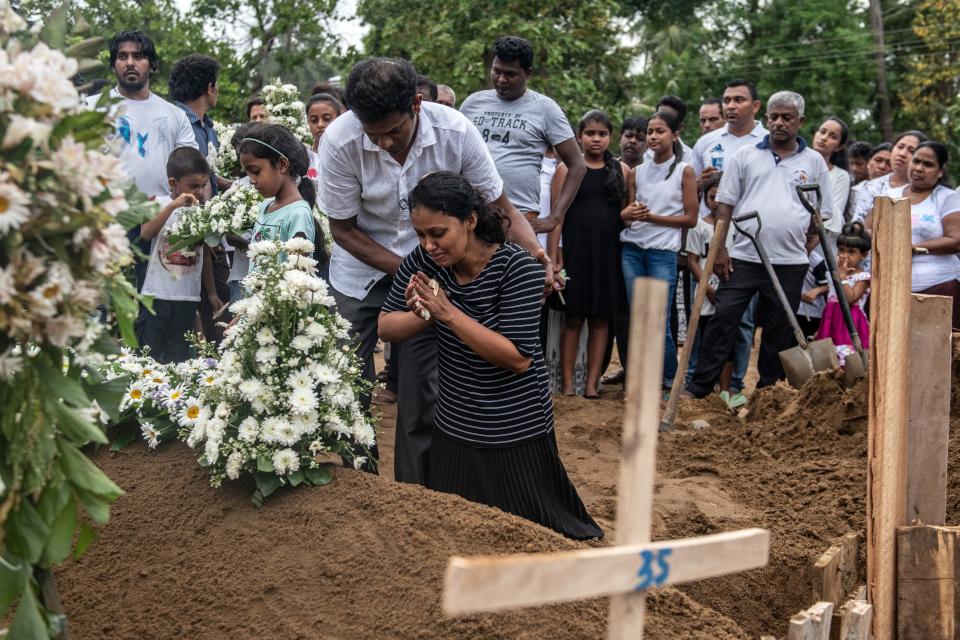'We are nervous': Sri Lankan PM warns of suspects with bombs at large amid fears of new attacks

Sri Lanka's leader said Thursday that suspects in Easter Sunday's bombing attack that killed at least 253 people, including 30 foreigners, at churches and luxury hotels in the country were still at large and might be carrying explosives.
Prime Minister Ranil Wickremesinghe spread the warning through the Associated Press as Sri Lankan security services issued a public appeal for three women and one man suspected of involvement in the attack, which was claimed by the Islamic State group.
The U.S. Embassy in Colombo, the capital, urged people "to remain vigilant and avoid large crowds," especially at worship services for various faiths from Friday to Sunday.
The Rev. Niroshan Perera, a priest overseeing funerals of people killed in the Negombo blast at St. Sebastian’s church, said Catholic churches in the city, known as “Little Rome” for its many religious buildings, were all closed and canceled Mass upon the advice of government security officials.
Perera said an official warned him that police were searching for two armed suspects. “Little bit, we are nervous,” he said.
In Colombo, John Keells Holdings, parent company of the Cinnamon Grand hotel, one of the sites targeted in the Easter Sunday bombings, told employees at its hotel properties to stay inside “further to the communications we have received” in an email shared with the AP.
Police identified the suspects as Mohamed Shahid Abdul Haq, Fathima Latheefa, Abdul Cader Fathima Kadia and Pulasthini Rajendran, who had the alias Zara. All appeared to be in their 20s.
At least 58 people have been detained in connection with the bombings, among the world's worst terrorist attacks since 9/11, in which almost 3,000 people died.
Sri Lankan authorities lowered the official death count to 253, citing chaotic bombing scenes for the original higher figure of more than 350.
Investigators confirmed that nine suicide bombers took part in the assaults. They were all linked to National Thowheed Jamath, an Islamist movement, but Sri Lankan officials said they were linked to the Islamic State, or ISIS.
Mohamed Yusuf Ibrahim, a wealthy spice trader in Sri Lanka and the father of two suspected suicide bombers, was arrested Thursday on suspicion of helping his sons in the attacks. One of the brothers spent time studying in the United Kingdom, which warned its nationals against all but essential travel to Sri Lanka.

Former navy chief Jayanath Colombage, a counterterrorism expert, confirmed the father's arrest to the AP.
Ibrahim lives in a mansion in Dematagoda, a wealthy Colombo neighborhood. Investigators said suspects detonated a ninth bomb Sunday that killed three police officers pursuing them. A white BMW was parked outside a garage partially blown out in the blast.
Officials said many of the bombing suspects were highly educated and came from well-off families in the neighborhood.
In one house, Buhari Mohammed Anwar, 77, a retired primary school teacher, said his neighbor, a suspect, was a nice person who helped the poor, the AP reported.
Of the suspected suicide bombers, he said, “Their father … didn’t expect this. Their father advises them every day. But they don’t listen. Children became like that; they don’t listen.”
Sri Lankan authorities are reporting that additional attacks may occur targeting places of worship. Avoid these areas over the weekend, starting tomorrow, April 26th through Sunday, April 28th. Continue to remain vigilant and avoid large crowds. #srilanka pic.twitter.com/4kjd57Dcty
— U.S. Embassy Colombo (@USEmbSL) April 25, 2019
A senior Sri Lankan government spokesman, Sudarshana Gunawardana, told CNN that one of the bombers, Ilham Ahmed Ibrahim, had been arrested and released.
Sri Lankan President Maithripala Sirisena demanded the resignation of the defense secretary and the national police chief after security forces failed to heed warnings of threats against churches
In a statement via AMAQ, the self-styled Islamic State news outlet, the militants said "members of the U.S.-led coalition and Christians in Sri Lanka" had been targeted.
Sri Lanka, located in the Indian Ocean off the southeast coast of India, is largely Buddhist but has minority Christians, Muslims and Hindus among its population of 22 million.
It has been mostly peaceful for the past 10 years after the end of a civil war against Hindu, ethnic Tamil separatists.
President Sirisena was due to meet representatives of different faiths Thursday to address concerns of a sectarian backlash.
Contributing: The Associated Press
This article originally appeared on USA TODAY: 'We are nervous': Sri Lankan PM warns of suspects with bombs at large amid fears of new attacks

